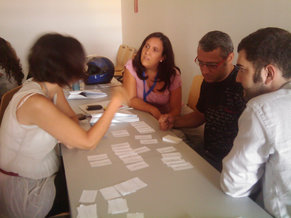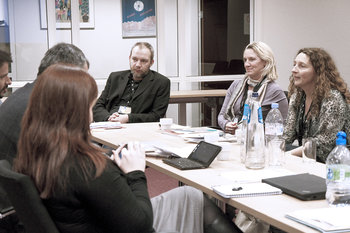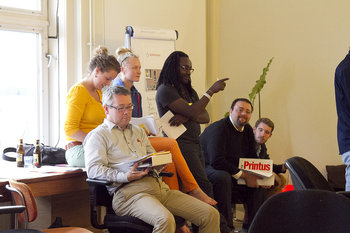
Word Choice
Choosing the word that means what you think it means.✗ There dog ate my shoes.
✓ Their dog ate my shoes.
✓ Their dog ate my shoes.
Complete Sentences
A complete sentence has a subject, verb and makes sense as a complete thought.✗ Ate the hamburger.
✓ Alice ate the hamburger.
✗ Rick policy.
✓ Rick influenced policy.
✗ Rick went to the winter.
✓ Rick went to the winter event.
✓ Alice ate the hamburger.
✗ Rick policy.
✓ Rick influenced policy.
✗ Rick went to the winter.
✓ Rick went to the winter event.
Run-on Sentence
Two or more complete sentences that are presented as one. This can be addressed with a semicolon or by separating the sentences.✗ I went to the conference Rick was there and was set to give a speech he seemed a little nervous.
✓ I went to the conference. Rick was there and was set to give a speech; he seemed a little nervous.
✓ I went to the conference. Rick was there and was set to give a speech; he seemed a little nervous.
Subject-Verb Agreement
Plural subjects require a plural verb and singular subjects require a singular verb.✗ He walk six miles every day.
✓ He walks six miles every day.
✗ She are happy.
✓ She is happy.
✓ He walks six miles every day.
✗ She are happy.
✓ She is happy.
Split Infinitives
An infinitive is the use of "to" + verb such as "to compete." A split infinitive occurs when you try to put other words between.✗ She was determined to quickly buy a bike.
✓ She was determined to buy a bike quickly.
✓ She was determined to buy a bike quickly.
Parallel Structure
Parallel structure is the presentation of multiple ideas in a consistent format. This can happen at the word, phrase or clause level. Parallel structure is a rule that some writers will break for effect.✗ People were coming, going and ignored him.
✓ People were coming, going and ignoring him.
✓ People were coming, going and ignoring him.
Modifier Placement
A modifier is a word that serves to color another word. These are usually adjectives such as "interesting" or adverbs such as "loudly" but can also be descriptive phrases. A misplaced modifier is a modifier that isn't placed directly adjacent to the word it modifies. A dangling modifier is when you try to modify a word that's not present in the sentence at all.✗ The woman was lost with the hat.
✓ The woman with the hat was lost.
✗ Even more were inside.
✓ Even more people were inside.
✓ The woman with the hat was lost.
✗ Even more were inside.
✓ Even more people were inside.
Pronoun Ambiguity
A pronoun is a word that is used instead of a noun. Common examples of pronouns include I, me, we, they, he, she, it, that and this. Pronouns can be used in a way that is confusing due to ambiguity regarding which noun you are replacing.✗ Marty and Jim had an exam last week, he did well.
✓ Marty and Jim had an exam last week, they did well.
✓ Marty and Jim had an exam last week, Jim did well.
✓ Marty and Jim had an exam last week, they did well.
✓ Marty and Jim had an exam last week, Jim did well.
Superfluous Commas
Incorrectly placed and unnecessary commas. For example, it is typically incorrect to place a comma in front of a conjunction such as "because."✗ She ate cereal, because she was hungry.
✓ She ate cereal because she was hungry.
✓ She ate cereal because she was hungry.
Missing Commas
Commas that are missing where they are required. For example, the items in a list are separated with a comma.✗ I like drawing my coworkers and my dog.
✓ I like drawing, my coworkers and my dog.
✓ I like drawing, my coworkers and my dog.
Possessive Apostrophe
An apostrophe + "s" is added to a noun to indicate possession. In the case that a plural noun ends in "s" the apostrophe is added to the end. The latter rule is sometimes dropped by modern style guides as it can be perceived as pretentious.✗ Ricks Cafe
✓ Rick's Cafe
✗ childrens toys
✓ children's toys
✗ the twins Dad
✓ the twins' Dad†
† often dropped by modern style guides✓ Rick's Cafe
✗ childrens toys
✓ children's toys
✗ the twins Dad
✓ the twins' Dad†
Capitals
The first letter in a sentence is capitalized as well as proper nouns, family relationships, days of the week, the months of the year, holidays, directions and the pronoun "I."✗ On friday, sarah went to germany.
✓ On Friday, Sarah went to Germany.
✓ On Friday, Sarah went to Germany.
































